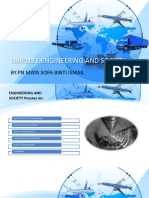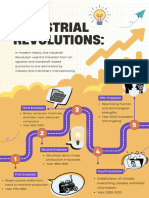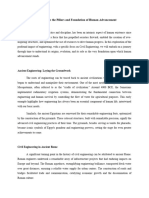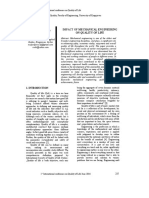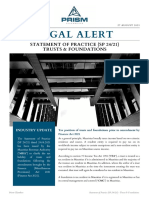Title: The Impact of Earlier and Recent Engineering on
Society
Introduction
For millennia, engineering has been a driving force in societal development.
Engineering has had a huge impact on our environment, from ancient
buildings to current technological wonders. This assignment investigates how
early engineering inventions paved the way for societal evolution, as well as
how modern engineering advancements continue to improve our quality of
life, solve complicated challenges, and fuel economic growth. We may better
understand engineering's vital role in societal evolution by looking at both its
historical and present implications.
Earlier Engineering: Foundations of Modern Society.
1. Infrastructure Development
Earlier engineering successes were largely concerned with the construction of
necessary infrastructure, such as roads, bridges, aqueducts, and buildings.
Ancient civilizations such as the Romans, Egyptians, and Greeks were
pioneers in developing complex technical solutions to facilitate commerce,
communication, and defense. The Roman aqueducts, for example, were civil
engineering wonders that provided fresh water to communities while also
considerably improving public health and cleanliness. Similarly, road
development aided trade and military transportation, which helped to
maintain economic stability and expand territorially.
The building techniques and materials employed by previous engineers paved
the way for present civil engineering procedures. Stone masonry, the usage of
arches, and the creation of early types of concrete are just a few instances of
Sanjay Marcus
RA2411050010025
�historical engineering approaches that have affected modern practices. These
early breakthroughs established the infrastructure required to sustain rising
populations and expanding economies, hence promoting societal growth.
2. Agricultural Advancements
Another crucial area where previous engineering had a huge influence was
agriculture. The discovery of tools like the plow and the building of irrigation
systems allowed cultures to transition from nomadic to sedentary agricultural
communities. Windmills and water wheels were engineered to supply the
power required to process grain and pump water, hence boosting food
production and supporting greater populations.
These agricultural innovations not only provided food security, but also aided
civilizational expansion by allowing for commerce and excess production. The
surplus created by improved farming methods enabled nations to invest in
areas such as education, culture, and technology, establishing the
groundwork for future progress.
3. Mechanical Engineering and the Industrial Revolution
The Industrial Revolution was a watershed moment in engineering's influence
on society. Earlier engineering ideas were used to create technology capable
of mass production, which transformed economies and society. James Watt
invented the steam engine in the 18th century, which transformed
transportation and industries. It permitted higher production rates while
reducing dependency on human and animal labor, resulting in increased
productivity and economic prosperity.
The Industrial Revolution also resulted in urbanization, as people relocated
from rural regions to cities in pursuit of jobs generated by new enterprises.
Sanjay Marcus
RA2411050010025
�While rapid urbanization created social difficulties such as overcrowding and
bad working conditions, it also fueled the creation of novel technical solutions
in public health, sanitation, and urban planning, which are still influencing
current society.
Recent Engineering: Driving Modern Innovation and
Sustainability
1. Technological Advancements
Recent engineering has been marked by tremendous technical developments
that have transformed practically every area of human existence. The
advancement of digital technology, notably computers and the internet, has
revolutionized communication, business, education, and entertainment.
Computer engineering, electrical engineering, and software engineering have
all contributed significantly to technological developments.
The introduction of smartphones, artificial intelligence, and the Internet of
Things (IoT) has resulted in a highly linked world where information is easily
available. This connectedness has facilitated worldwide cooperation,
creativity, and economic development, allowing firms to function more
effectively and giving people unparalleled access to information and services.
2. Medical Engineering and Healthcare Improvements
Healthcare is one of the areas where contemporary engineering has had the
greatest influence. Biomedical engineering has resulted in the creation of new
medical equipment, diagnostic tools, and therapies that have significantly
improved patient care and results. Innovations such as MRI equipment,
robotic surgery, artificial limbs, and wearable health monitors have
transformed healthcare delivery and management.
Sanjay Marcus
RA2411050010025
�These improvements have not only increased life expectancy, but also
enhanced the quality of life for millions of people throughout the world.
Engineering solutions have enabled early illness diagnosis, minimally invasive
operations, and individualized treatment, hence improving healthcare
efficiency and accessibility. The integration of artificial intelligence and
machine learning in healthcare is opening the way for predictive analytics and
individualized treatment regimens, which will improve patient care even more.
3. Sustainable Engineering and Environmental Protection
As the globe faces severe environmental concerns, contemporary engineering
has concentrated on providing long-term solutions to reduce the impact of
human activity on the earth. Civil and environmental engineers lead the way in
the design of green buildings, sustainable urban planning, and renewable
energy systems including wind, solar, and hydropower.
The need to minimize carbon emissions, protect natural resources, and
encourage environmental stewardship drives the transition to sustainable
engineering techniques. Materials science innovations have resulted in the
creation of eco-friendly materials and construction practices, minimizing the
environmental impact of buildings and infrastructure. Furthermore, advances
in waste management and water treatment technology are helping to solve
pollution and resource shortage concerns.
4. Transportation and Urban Planning
Recent technical advances have also improved transportation and urban
planning, making cities more livable and sustainable. The development of
electric vehicles (EVs), self-driving cars, and high-speed rail networks is
changing the way people and things move. These advances reduce
dependency on fossil fuels, cut greenhouse gas emissions, and improve
urban air quality.
Sanjay Marcus
RA2411050010025
�Recent technical breakthroughs have improved urban planning and civil
engineering as well. Smart city efforts incorporate information and
communication technology (ICT) into urban design, resulting in more efficient,
sustainable, and resilient cities. These projects include smart grids for energy
distribution, intelligent traffic management systems, and sustainable public
transit options, all of which strive to improve urban living while minimizing
environmental effect.
Conclusion
Engineering, both historically and recently, has played an important role in
molding civilization. Earlier engineering established the basis of
contemporary society by creating infrastructure, agricultural breakthroughs,
and mechanical innovations. Technological breakthroughs, healthcare
improvements, sustainable practices, and urban planning innovations have
all contributed to societal growth in recent years. As society faces new
difficulties, engineering will continue to play an important role in discovering
solutions to stimulate economic growth, improve quality of life, and secure a
sustainable future. The ongoing evolution of engineering processes and
technology demonstrates the discipline's persistent value in improving human
civilization and tackling today's complicated issues.
Sanjay Marcus
RA2411050010025
� Sanjay Marcus
RA2411050010025










